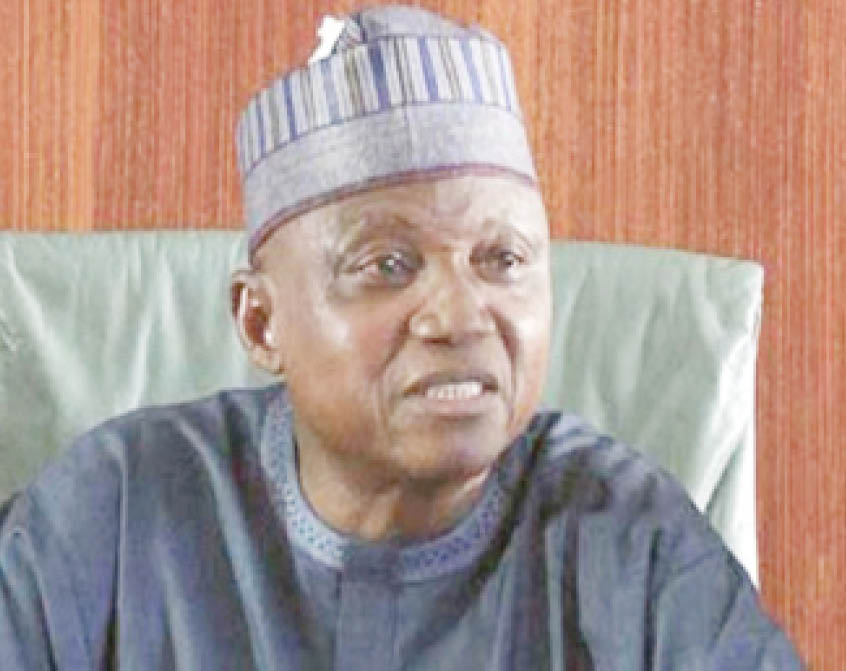The Senior Special Assistant to President Muhammadu Buhari on Media and Publicity, Mallam Garba Shehu, last week said Nigerian universities have so far been performing better than their foreign counterparts.
He made the assertion on Saturday at the 11th graduation ceremony of Glisten International Academy, Abuja.
- Presidency, NUPRC fracas puts $1.28bn Seplat, ExxonMobil deal in limbo
- Anambra communities in panic harvest over flood menace
Verdict: FALSE
Full Text: The Senior Special Assistant to President Muhammadu Buhari on Media and Publicity, Mallam Garba Shehu, while speaking on Saturday, 6th August, at the 11th graduation ceremony of Glisten International Academy, Abuja, said Nigeria’s universities are good enough and even better just as the presidency is working towards stabilising the educational system to encourage parents to retain their children to learn in the country’s tertiary institutions.
Shehu, whose son is also graduating from the school, advised the students to make good use of their studies.
“For the graduating students, I want to say that they have a major decision to make, which is going to the next level in their educational pursuit.
“You can see that a lot of foreign institutions are extending invitations to students at discounted rates to study overseas.
“I will say that Nigerian universities are equally as good and even better and we are hoping that we will be able to stabilise the university education in the country so that parents don’t have to pay exorbitantly to educate their children abroad,” he said.
Verification: In verifying the claim by Mr. Shehu, Daily Trust sought to find out the parameters used in ranking universities globally.
Consequently, findings by this newspaper show that four key parameters are used to rank universities worldwide. They are teaching, research capacity, international diversity and financial sustainability.
Sustainable funding
Daily Trust observes that the budgetary allocation to the education sector by the 36 states of the federation, all of which own at least one university each, shows that only paltry sums are budgeted for funding tertiary institutions.
For instance, while the United Nations Educational, Scientific and Cultural Organisation (UNESCO) convention recommends 25 per cent for the sector, Nigeria is lagging behind as it has not achieved even 15 per cent allocation to the education sector.
In the 2022 budget, the education sector got only N1.29 trillion representing 7.9 per cent of the total budget of about N18 trillion.
This shows that the allocation is less than 10 per cent even though UNESCO recommended that developing nations should give up to 25 per cent of their annual budgets to public education.
Further checks show that so far in the Buhari administration, the federal government has only released about N3.5 trillion to education and this represents less than 10 per cent, compared to defense, which has gulped trillions of naira without the desired results justifying the huge spending.
This critical sector has been deprived of adequate funding with a dearth of infrastructure, poor welfare, inadequate staffing among the challenges impeding the sector and hampering effective learning across primary, secondary and tertiary institutions.
Research capacity
Checks by Daily Trust also revealed that the research base in Nigerian universities has been below average for quite some time now.
In fact, the research capacity of Nigerian lecturers has been a subject of discourse at different fora, with experts calling on the federal government, through the Tertiary Education Trust Fund, to improve research funding for lecturers.
Worthy of note is the fact that Nigerian lecturers, in most cases, are sponsored to carry out research in foreign universities so they can deploy the knowledge learnt in their mother institution.
Teaching
In terms of teaching, there have been sustained calls by experts for improvement in methods, especially in the adoption of technology in impacting knowledge, as the current trend in Nigerian universities is far below standard.
In fact, the founder of Afe Babalola University, Ado Ekiti, Chief Afe Babalola (SAN), had advocated the re-introduction of teacher training education, which was scrapped years ago by the federal government.
The renowned lawyer expressed fear that unless appropriate damage control mechanisms are taken without further delay, many Nigerian graduates would likely continue to be unemployable.
He said: “The state of education in Nigeria today is no doubt deplorable and highly undesirable at all levels. Tertiary education, in particular, has become a mere formal process for obtaining higher certificates without imparting the substance for which the institutions were established.
“Some of the problems are traced to poor teaching and learning methods, among others. A very critical area which has also been neglected is that of quality teaching methods.”
He said it was difficult for any foreign university to go on strike as the system is well grounded with adequate teaching and learning facilities backed by funding that makes the system work.
International diversity
For most experts in the education sector, that Nigerian universities are ranked so low should not have come as a surprise because the country’s public universities are hardly patronised by foreigners, rather, the reverse is the case. In fact, it becomes difficult for foreigners to attend Nigerian universities as a result of the fact that consistently, teaching and research are interrupted by prolonged Academic Staff Union of Universities (ASUU) strikes.
For instance, checks by Daily Trust have shown that for more than four months now, Nigeria’s public universities have not been in session because of yet another strike embarked on by the lecturers’ union.
This means that the universities whose rankings are to be assessed are not even in session.
Under the administration of President Muhammadu Buhari, undergraduates in universities across the country have lost not less than 13 months of their educational calendar, owing to recurring strike actions by the Academic Staff Union of Universities (ASUU).
The ongoing strike by ASUU began on February 14, 2022, to demand better conditions of service as contained in the agreement it reached with the government in 2009.
Foreign universities now abode for politicians’ children
Meanwhile, Daily Trust recently reported how foreign universities have now become an abode for children of rich Nigerians, especially politicians.
Most recently, Jordan Nyesom-Wike, son of Rivers State Governor Nyesom Wike graduated from the University of Exeter, United Kingdom – on July 11.
Wike was a minister of state for Education under the Goodluck Jonathan’s administration.
Same goes to Mohammed Sani Badaru, the son of Jigawa State Governor Badaru Abubakar, who also graduated from Brunel University London, United Kingdom, on July 14, 2022.
Similarly, Mayo, a son of Gbenga Daniel, a former governor of Ogun State, graduated with a master’s degree from the University of London, England.
Mayo is said to have earned the degree in real estate on July 20 this year.
No Nigerian university among top 300 universities in the World – Report
According to the latest Times Higher Education Impact Rankings, the best university in Nigeria, is Afe Babalola University Ado-Ekiti, (ABUAD) which ranks 400th in the global rankings.
The Times Higher Education Impact Rankings measure global universities’ successes in delivering the United Nations’ 17 Sustainable Development Goals (SDGs) in the discharge of their academic activities – teaching, research and community service (outreach) and stewardship.
The latest ranking, The 2022 Impact Rankings, is the fourth edition, and the overall ranking includes 1,406 universities from 106 countries or regions.
The rankings analysed more than 108 million citations across over 14.4 million research publications and included survey responses from almost 22,000 scholars globally.
Consequently, no African country made it to the top 100 universities in the ranking. The best-ranked university in the continent, according to the report, is South Africa’s University of Cape Town, at 183rd position. In Nigeria, the universities of Ibadan and Lagos ranked 401st and 501 respectively.
Conclusion: Following world universities rankings and the current state of education in Nigeria, Daily Trust concludes that Nigerian universities are not better than their foreign counterparts, as such, the claim by Garba Shehu is FALSE.
This Factcheck is produced in colaboration with Centre for Democracy and Development.

 Join Daily Trust WhatsApp Community For Quick Access To News and Happenings Around You.
Join Daily Trust WhatsApp Community For Quick Access To News and Happenings Around You.

